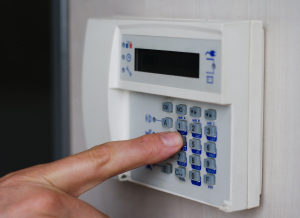When it comes to protecting your home or business from fires, it’s important to equip your property with advanced devices to detect the first signs of heat. Thankfully, heat detectors give home and business owners additional peace of mind knowing that their occupants and assets are safer. But what are they and how many types of heat detectors are there ? In this month’s blog, we’ll explore the functions and features of the 4 types of heat and smoke detectors.
What are Heat Detectors?
These devices can accurately detect and respond to convected thermal energy. Once detected, an alarm will sound to notify nearby occupants. Heat sensors are not meant to replace smoke detectors. Rather, they are used in areas where smoke detectors cannot go such as kitchens, laundry rooms, or utility closets. This is because smoke alarms are prone to sounding false alarms when excessive dust or steam is found in an area.

What Are the Types of Heat Sensors?
Fixed Temperature
Fixed temperature heat sensors are perhaps the most common type found in homes and businesses. These simple yet effective devices sound an alarm when heat-sensitive eutectic alloys inside liquify in response to significant heat in the immediate area. Due to a thermal lag feature, you are able to adjust its heat detection threshold to better suit your environment.
Rate-of-Rise
Rate-of-rise thermal detectors, often referred to as ROR detectors, signal an alarm when there’s a rapid increase in heat, from 12 degrees to 15 degrees Fahrenheit. Unlike fixed temperature detectors, ROR detectors can operate in a lower temperature threshold. Further, the devices utilize heat-sensitive thermocouples, which are electronic devices that accurately measure temperature compared to thermometers. When adjusted properly, you can reduce the likelihood of false alarms. These types often have a factory set point of 136.4 degrees Fahrenheit before they sound an alarm.

What are the Types of Smoke Detectors?
Ionization Smoke Detector
Ionization smoke detectors have an electrical current that runs through two metal plates inside the device. When smoke is present, it interrupts the electrical current, which causes the alarm to go off. These detectors are ideal for detecting fires that spread quickly.
Photoelectric Smoke Detector
Photoelectric smoke detectors go off when the light inside of the device is disrupted by smoke. This device detects small fires faster than an ionization smoke detector and are dependable. You won’t have to worry about false alarms.
Choosing the Right One
It’s important to choose the right device for your home or business. As mentioned previously, heat sensors should not replace smoke detectors. Advanced fire alarms should still be used in bedrooms, offices, and hallways to give your loved ones or employees the proper notification they need to take action and evacuate your home or building. They should be used in tandem with sprinklers, carbon monoxide detectors, and other essential fire alarm systems.
So, which of the 4 types of heat and smoke detectors is best for you? It truly depends on the location. For example, if a ROR thermal sensor was installed near a large oven, it may sound a false alarm each time it’s opened due to the drastic shift in temperature. However, a fixed heat temperature detector could be adjusted to ignore the heat threshold while still seeking greater heat sources. ROR heat sensors are best used in areas that have highly combustible materials since it’s able to detect rapidly increasing heat. This intensely rising heat may exceed the alarm threshold of a fixed temperature device, making it more difficult to sound an alarm. Now that you know how many types of heat detectors are there, you can talk to a fire alarm expert to find out which types will work best throughout your home or business.
Why Mesa?
At Mesa Alarm Systems, we’ve been protecting Houston homes and businesses since 1990, and we’re proud to offer some of the most advanced fire protection devices on the market. Our professional staff will work with you to achieve customized goals for your property and can provide a higher level of support with our 24/7 monitoring services. Want to learn more? Visit us online or contact us today to get the best in home or commercial fire protection. Learn more about our products and services today by calling (281) 694-4313.



